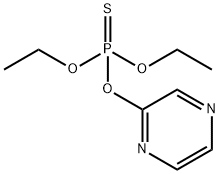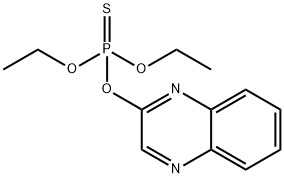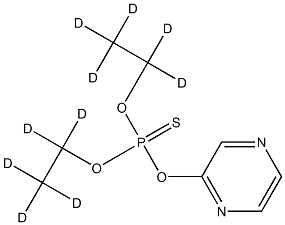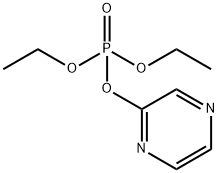THIONAZIN
Synonym(s):O,O-Diethyl O-(2-pyrazinyl) phosphorothioate
- CAS NO.:297-97-2
- Empirical Formula: C8H13N2O3PS
- Molecular Weight: 248.24
- MDL number: MFCD00055349
- EINECS: 206-049-6
- SAFETY DATA SHEET (SDS)
- Update Date: 2023-05-15 10:43:39

What is THIONAZIN?
Chemical properties
Amber liquid. Slightly soluble in water; miscible with most organic solvents.
The Uses of THIONAZIN
Nematocide; insecticide.
Definition
ChEBI: Thionazin is an organic thiophosphate.
General Description
Amber liquid. Pure compound is almost colorless; technical product is light brown to tan. Used in insecticides, fungicides, and nematocides. Not registered as a pesticide in the U.S.
Reactivity Profile
Organothiophosphates, such as THIONAZIN, are susceptible to formation of highly toxic and flammable phosphine gas in the presence of strong reducing agents such as hydrides. Partial oxidation by oxidizing agents may result in the release of toxic phosphorus oxides.
Hazard
Toxic by ingestion, inhalation, and skin absorption; cholinesterase inhibitor.
Health Hazard
Cholinesterase inhibitor. (Non-Specific -- Organic Phosphate Compound, Liquid, Poison B). Poisonous; may be fatal if inhaled, swallowed or absorbed through skin. Contact may cause burns to skin and eyes.
Health Hazard
Extremely toxic by ingestion and skinabsorption; cholinesterase inhibitor; exhibitsacute, delayed, and chronic effect; symptomsof cholinergic effects include excessive salivation, lacrimation, blurred vision, musclespasms, headache, weakness, mental confusion, vomiting, diarrhea, stomach pain, convulsions, and coma; also causes shortnessof breath, respiratory depression, and respiratory paralysis; ingestion of small quantity(0.5–1.59) could be fatal to adult humans;poisoning effects may onset several hoursafter exposure.
LD50 oral (rat): 3.5–6 mg/kg
LD50 oral (mouse): 5 mg/kg
LD50 skin (rat): 8 mg/kg
LD50 skin (guinea pig): 10 mg/kg.
Fire Hazard
(Non-Specific -- Organic Phosphate Compound, Liquid, Poison B). THIONAZIN may burn but does not ignite readily. (Non-Specific -- Organic Phosphate Compound, Liquid, Poison B). Fire may produce irritating or poisonous gases.
Safety Profile
Poison by ingestion, skin contact, and ocular routes. A cholinesterase inhibitor type of insecticide. When heated to decomposition it emits highly toxic fumes of NOx, POx, and SOx. See also PARATHION.
Properties of THIONAZIN
| Melting point: | -1.7℃ |
| Boiling point: | bp 80° |
| Density | 1.204-1.210 g/cm3 (25 ºC) |
| refractive index | 1.5131 (589.3 nm 25℃) |
| Flash point: | 100 °C |
| storage temp. | 2-8°C |
| solubility | Chloroform (Sparingly), Ethyl Acetate (Slightly), Methanol (Slightly) |
| pka | -1.22±0.10(Predicted) |
| form | liquid |
| Water Solubility | 1.14g/L(25 ºC) |
| BRN | 884916 |
| Stability: | Hygroscopic |
| EPA Substance Registry System | Thionazin (297-97-2) |
Safety information for THIONAZIN
| Signal word | Danger |
| Pictogram(s) |
 Skull and Crossbones Acute Toxicity GHS06 |
| Precautionary Statement Codes |
P262:Do not get in eyes, on skin, or on clothing. P264:Wash hands thoroughly after handling. P264:Wash skin thouroughly after handling. P270:Do not eat, drink or smoke when using this product. P280:Wear protective gloves/protective clothing/eye protection/face protection. P301+P310:IF SWALLOWED: Immediately call a POISON CENTER or doctor/physician. |
Computed Descriptors for THIONAZIN
New Products
4-AMINO-TETRAHYDRO-PYRAN-4-CARBOXYLIC ACID HCL 4-(Dimethylamino)tetrahydro-2H-pyran-4-carbonitrile 4-AMINO-TETRAHYDRO-PYRAN-4-CARBOXYLIC ACID 4-Aminotetrahydropyran-4-carbonitrile Hydrochloride (R)-3-Aminobutanenitrile Hydrochloride 5-Bromo-2-nitropyridine Nimesulide BP Aceclofenac IP/BP/EP Diclofenac Sodium IP/BP/EP/USP Mefenamic Acid IP/BP/EP/USP Ornidazole IP Diclofenac Potassium 3-Bromopyrazole (3aR,4R,5R,6aS)-hexahydro-5-Triethyl silyloxy-4-((E)-3-oxo-5-phenylpent-1- enyl)cyclopenta[b]furan-2-one. 1-Chlorocarbonyl-4-piperidinopiperidine 1-Bromo-4-phenyl-2-Butanone 4-Amino-2-fluoro-N-methylbenzamide 1,1'-Carbonyldiimidazole SODIUM AAS SOLUTION ZINC AAS SOLUTION BUFFER SOLUTION PH 10.0(BORATE) GOOCH CRUCIBLE SINTERED AQUANIL 5 BERYLLIUM AAS SOLUTIONRelated products of tetrahydrofuran






![THIONAZIN-O-ANALOG 100MG [R]](https://img.chemicalbook.in/)

You may like
-
 Thionazin CAS 297-97-2View Details
Thionazin CAS 297-97-2View Details
297-97-2 -
![Dimethyl [2-oxo-3-[3-(trifluoromethyl)phenoxy]propyl]phosphonate 99%](https://img.chemicalbook.in//Content/image/CP5.jpg) Dimethyl [2-oxo-3-[3-(trifluoromethyl)phenoxy]propyl]phosphonate 99%View Details
Dimethyl [2-oxo-3-[3-(trifluoromethyl)phenoxy]propyl]phosphonate 99%View Details
54094-19-8 -
 85-81-4 99%View Details
85-81-4 99%View Details
85-81-4 -
![208111-98-2 (3aR,4R,5R,6aS)-5-(Benzoyloxy)hexahydro-4-[(1E)-3-oxo-4-[3-(trifluoromethyl)phenoxy]-1-buten- 1-yl]-2H-cyclopenta[b]furan-2-one 99%](https://img.chemicalbook.in//Content/image/CP5.jpg) 208111-98-2 (3aR,4R,5R,6aS)-5-(Benzoyloxy)hexahydro-4-[(1E)-3-oxo-4-[3-(trifluoromethyl)phenoxy]-1-buten- 1-yl]-2H-cyclopenta[b]furan-2-one 99%View Details
208111-98-2 (3aR,4R,5R,6aS)-5-(Benzoyloxy)hexahydro-4-[(1E)-3-oxo-4-[3-(trifluoromethyl)phenoxy]-1-buten- 1-yl]-2H-cyclopenta[b]furan-2-one 99%View Details
208111-98-2 -
 2033-24-1 99%View Details
2033-24-1 99%View Details
2033-24-1 -
 Meldrums acid 2033-24-1 99%View Details
Meldrums acid 2033-24-1 99%View Details
2033-24-1 -
 Cyaclopentane carboxylic acid 99%View Details
Cyaclopentane carboxylic acid 99%View Details
3400-45-1 -
 2-Aminopyridine 504-29-0 99%View Details
2-Aminopyridine 504-29-0 99%View Details
504-29-0